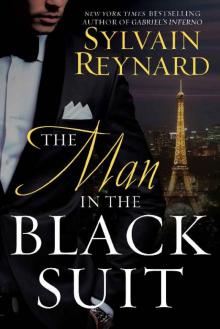- Home
- Sylvain Reynard
The Man in the Black Suit Page 3
The Man in the Black Suit Read online
Page 3
There wasn’t an elevator in the building, but few if any of the older buildings had them. Acacia trudged up the staircase, carrying her backpack.
“Hey.” Kate, Acacia’s American neighbor, greeted her in English as she approached.
“Hi.” Acacia paused as Kate locked the door of the flat she shared with her roommate, Violaine.
“What’s happening?” Kate pushed her riot of red hair back from her face. “I haven’t seen you in a while.”
“I’ve been working. How are you?”
“Tired. Graduate school is kicking my ass.” Kate pulled her knapsack over her shoulder. “Bernard is having a party Saturday night. You should come.”
“I’d like that.” Acacia smile was carefully neutral.
“You mean it, right? The last time you said you were coming, you never showed.” Kate made a face.
“I was called in to work. I’ll try to make it this time.”
“Great. Bernard throws the best parties, and he’ll be happy you’re coming.” Kate squeezed Acacia’s arm as she passed. “Give Claude a hug from me.”
Acacia chuckled and shook her head. Kate was lively and generous with her friends, of which she had many. She’d even tried to set Acacia up with Bernard, who was a journalist with Le Monde.
Bernard threw the best parties, it was true. He liked food and fine wine and always invited an interesting and diverse array of guests. But Acacia felt no spark of attraction with him, and getting involved with a journalist was far from safe.
She entered her flat. Claude greeted her with a meow and rubbed himself against her legs until she lifted him for a proper hug. He had large, yellow eyes and soft, black fur. She’d found him on the doorstep one wet and rainy night. With the exception of Acacia and Kate, he hated everyone.
“Olá, Fofo.” She murmured endearments to him in Portuguese before she fed him and opened her mail.
After a modest dinner and a generous glass of white wine, she pored over a printed copy of Monsieur Breckman’s guest profile, which she’d smuggled home in her backpack. It was possible he was embarrassed about asking Acacia to return the gifts for his girlfriend and that was why he’d preferred to deal with Marcel. But something about the hypothesis didn’t sit right with her.
“Marcel was supposed to set up a meeting.” Acacia addressed Claude, who was curled up in her lap as she sat at the kitchen table. “But there was nothing attached to Breckman’s reservation. It isn’t like Marcel to forget something.”
Claude blinked his yellow eyes, as if in acknowledgment.
“Unless Marcel tried to set up a meeting and failed,” Acacia thought aloud. “But wouldn’t he have notified Breckman before he arrived?”
Marcel was the senior concierge, and he took great pride in his work. He wouldn’t have forgotten a task for an important guest. And there was the matter of his assault. Acacia was inclined to believe the Paris police over Monsieur Breckman, but his assessment rang true. Marcel had been beaten badly, which didn’t seem to align with a random mugging.
She wondered if Monsieur Breckman spent much time watching American police dramas. He seemed to have a curious understanding of the criminal mind.
According to the smuggled file, Pierre Breckman was a businessman from Monaco. The nature of his business was not disclosed. He’d been accorded a four and a half star rating by the hotel, which Acacia found surprising. Five stars were reserved for royalty and heads of state. Four stars were usually given to celebrities of one sort or another. Pierre Breckman was neither, but clearly—as the management emphasized—he was a highly valued guest.
He was thirty-eight, had a fondness for jazz and Michelin-rated restaurants, and visited Paris several times a year. According to Marcel’s notations, it was not uncommon for Breckman to socialize with the world’s elite. He also enjoyed sporting events such as European football and the French Open.
During his stays at the Hotel Victoire, three different female companions, all significantly younger than him, had joined him in the past five years. Monsieur Breckman was not considered difficult or troublesome, which made his behavior earlier that day puzzling. Understandably, he was sensitive about his scar. But his file didn’t mention tantrums or outlandish behavior.
Silke Rainier, a Swiss model, had been Monsieur Breckman’s latest partner. Their separation must have been recent, as Marcel had included her in his remarks on the current reservation.
Acacia put the printed pages aside. She knew the reservations agents and housekeeping staff could have told her far more than was recorded in the file. But she wasn’t on friendly terms with the former and she didn’t want to make herself conspicuous to the latter, who were notorious for gossiping.
She opened her laptop and Googled “Pierre Breckman,” which yielded only enough information to confirm what was listed in the file. Strangely, none of the entries included photographs.
Googling Silke generated hundreds of entries. Although Acacia didn’t recognize her, photographs of Mademoiselle Rainier were splashed across the internet, including recent images of her sunbathing topless with an American film star on the deck of a yacht. The way she caressed her new man’s unmarred face seemed calculated, if not punitive to Monsieur Breckman, who would no doubt see the photos.
“What a cruel display,” Acacia whispered.
Claude responded by rubbing his head against her stomach, as if in agreement.
While Monsieur Breckman had been busy purchasing gifts for his girlfriend, she’d been topless with someone else. Acacia closed the browser window.
Monsieur Breckman was not the kind of man who would welcome pity. He’d reacted in anger when she’d apologized for staring at his scar. Of course, he’d probably seen the photos of his erstwhile girlfriend. No wonder he’d been so irritable.
But Monsieur Breckman’s interest in the attack on Marcel seemed of a personal nature, as were his questions about Marcel’s associates. Again, she scoured the reservation notes for information about a meeting, but found nothing.
Acacia took her membership in Les Clefs d’Or very seriously and would never disgrace the organization by participating in anything illegal. Not all concierges were as scrupulous. She’d never caught Marcel committing an infraction, but since he was her superior and discreet in the extreme, it was quite possible his compromises had gone undetected.
Acacia slid her hand under the neckline of her T-shirt and withdrew the hamsa amulet she always wore. She never took off this pendant of protection. However, given the antagonism in France toward religious symbols, she was careful to keep the necklace hidden.
Much later, she lay in bed while Claude curled up on top of the blankets next to her feet. She gazed sleepily at a print of one of her favorite paintings, Monet’s Twilight, Venice, which hung over the bed.
The Bridgestone Museum of Art in Tokyo owned the painting’s original. Although she’d never seen it in person, Acacia had fallen in love with it when she began studying Impressionism.
The painting featured the church of San Giorgio Maggiore, an island haven surrounded by water and sky. Monet had used oranges and pinks to convey the light of the setting sun, darkening to blues and greens at the edges of the painting. The church appeared like a floating city, dark and shadowy against the warm light.
She studied the brush strokes, admiring the way Monet had used wavy lines here and there to give the impression of gently moving waves.
If she focused very hard, she could forget everything around her and disappear into the painting. She could feel the fading sunlight dance across her skin. She could smell the scent of the sea.
Acacia was not an idealist. Any ideals she’d had were killed years ago in Amman. Of course, no one in her current life knew about that. She was determined to keep it that way, which was why she hid behind a navy uniform, serving a transient clientele and never letting anyone get too close—not
even Luc, her former boyfriend.
Acacia shut her eyes. She didn’t like thinking of Luc and how things had ended with him. She didn’t like thinking about lying next to him in this very bed, his hand smoothing across her naked skin while he whispered to her. She hadn’t had a lover since.
As much as she tried to deny it, Acacia was lonely. Rarely did she admit it and rarer still did she dwell on it. But like many, she longed for love and companionship. She longed for honesty and intimacy, even though she’d lived without them for years.
Acacia opened her eyes and rolled over. Claude meowed his annoyance at being discommoded.
Her position at the hotel paid well, and she received thousands of Euros in gratuities on top of her salary, which enabled her to support her mother in Recife. In addition, she was slowly building her savings—her exit strategy—and hoped someday she could work in a gallery.
By chance, her gaze landed on her work journal, which rested on her nightstand.
Every well-trained concierge kept a record of the requests made by hotel guests. She carried her journal at all times, which was why it was on her nightstand. The contacts and comments inside were too confidential to be left at the concierge desk or in her locker at the hotel.
If Monsieur Breckman had asked Marcel to set up a meeting, Marcel would have recorded the particulars. Indeed, any work he’d done for Breckman would have been written down, with the possible exception of illegal activities. No doubt Marcel had the journal with him when he was attacked, which meant it could be lying on the street near the hotel. Perhaps the police had overlooked it.
Acacia resolved to look for the journal before she began work the next morning.
Chapter Four
PIERRE BRECKMAN SAT on the exceptional terrace of his suite and stared at the brightly lit Eiffel Tower. He sipped vodka without tonic and wondered how all his plans had gone to hell.
Silke had ended things in a very public manner. His blood pressure increased as he recalled the photographs of her and her new lover. She was beneath his contempt for such a narcissistic display, but he was still angry. She’d wounded his pride, although he was loath to admit it. It hadn’t been the first time.
He strode to the edge of the terrace and leaned over the railing. He could hear Rick’s evening replacement step outside, simply to keep an eye on him.
Then he thought of the tall, Brazilian woman with the striking hazel eyes. She’d stood in his suite and argued the virtues of Monet.
There was an earnestness about her that piqued his interest. She was professional and honest, or so she appeared. Given the moral state of her colleagues, he had his suspicions.
Pierre sipped his drink. Corruption could be enticed and drawn into the open with a few well-placed suggestions.
As his anger retreated, he was conscious of the weakening effects of rage. It made one rash. It made one foolish. He’d vowed never to be those things again.
The Eiffel Tower winked at him, beckoning him to visit her. To do so, he’d need a companion worthy of so beautiful and romantic a location.
Sometimes it seemed as if he were surrounded by vipers. Nowhere was the kind of woman worthy of the Eiffel Tower.
He turned his back on her and went inside.
Chapter Five
THE NEXT MORNING, Acacia visited her local dojo much earlier than usual so she would have time to search for Marcel’s journal.
She kept secret the fact that she studied martial arts. Luc had known, of course. When they were together, her daily visits to the dojo had coincided with his time at the gym.
Her mother had enrolled her in Brazilian jiu-jitsu classes as a child, in the hope it would enable her to defend herself. Indeed, the classes had proved successful. When she came to France, she switched to karate. Acacia prized the quiet confidence martial arts gave her as much as the strength it gave her body.
She arrived at the hotel forty-five minutes before her shift and parked her motorcycle near one of the pedestrian entrances to the Victoire’s underground parking lot, which was across the street from the hotel.
She took care to survey her surroundings before she switched off her bike. Avenue George V was always busy—cars parked here and there, traffic consistently moved down the street, and pedestrians dotted the sidewalks. She was cautious as she approached Marcel’s motorcycle, which was parked nearby.
The Avenue ran through a neighborhood that housed luxury boutiques, including Hermès, Bulgari, Givenchy, and Saint Laurent. The street had two medians shaded by mature trees. Tall buildings lined both sides. Owing to the number of parked cars and vans, there were many places to hide.
Other motorcycles flanked Marcel’s. Remnants of police tape could still be seen clinging to his bike, but the area had been swept clean.
Acacia looked under the motorcycles and Vespas in search of his journal. She looked on the street, the sidewalk, and checked the gutters. She even peered into a nearby garbage bin. The journal was not to be found.
It occurred to her as she scanned the area that there was something odd about the attacker’s choice of location, which was across the street from the hotel. Given the busyness of the street, the assault must have been seen. But no witnesses had come forward, with the exception of the person who’d stumbled upon Marcel’s bleeding body and called the police.
Being a concierge was in some respects like being a detective. One had to solve problems, find things, and on occasion, locate people. Acacia wondered if Marcel had found something that put him at risk.
She walked the short distance to the hotel’s service entrance and changed in the staff room, arranging her concierge pins with pride on her navy blue uniform. At the beginning of her shift, she sat behind the concierge desk and placed her journal next to the hotel’s laptop. She checked the day’s calendar and reached for her pen. It was gone.
Thinking she’d knocked it to the floor, she pushed her chair back and looked under the desk. The pen sat on the floor to the right, underneath one of the desk drawers. She reached forward to retrieve it and as she withdrew, her hand brushed against the drawer.
But instead of the solidity of wood, she touched something else. Puzzled, she felt along the bottom of the drawer. Someone had attached what seemed like a book to the underside.
“I need the concierge.” An imperious voice sounded above her.
Acacia sat up and pushed her chair closer to the desk. She smiled at a well-dressed, elderly woman. “Yes, madame.”
Out of the corner of her eye, she saw Monsieur Breckman enter the lobby, dressed in another black suit and surrounded by a security detail that had swelled to six men.
She wondered if he always wore black suits. She wondered if the Earth would cease moving on its axis if he wore, say, navy blue.
He was headed toward the reservations desk. When he caught sight of her, he switched direction, as did his security detail, who trailed like a series of large, dark-suited ducklings after their mother.
The elderly woman sniffed, as if Acacia’s momentary distraction was a waste of her valuable time.
Acacia widened her smile and gestured to one of the chairs. “I am the concierge, madame. How may I help you?”
The woman refused to make eye contact and adjusted her Chanel jacket. “I don’t want to speak with someone from Spain. I want a French concierge.”
Acacia kept her smile firmly in place. “I’m from Brazil, but I live here in Paris. I would be happy to assist you.”
“Go and find a French concierge.” The woman settled herself in one of the chairs, not bothering to look in Acacia’s direction.
“Good morning, mademoiselle,” Monsieur Breckman addressed Acacia as he approached the desk. He looked down his nose at the elderly woman. “When you’re finished with the concierge, I need to speak with her.”
“I don’t deal with foreigners,” the woman said primly. “I’m
waiting to speak to a French concierge.”
The man rocked back on his heels and his dark brows snapped together. “Foreigners? And where are you from, madame?”
The woman brushed her fingers across the gold insignia of her Chanel handbag. “I am from Lyon.”
“Really?” Breckman’s eyes glittered impishly. “Then you must be familiar with Lyon’s history.”
The woman frowned up at him. “Certainly. I’ve lived there my entire life.”
“Then it’s almost certain you, too, are an immigrant.” The man examined the ceiling, as if deep in thought. “If I remember my Lyonnais history correctly, Roman immigrants arrived from Vienne in the first century. Were you there then?”
The woman sputtered, but Monsieur Breckman continued. “What about the Burgundian refugees who escaped from the Huns in the fifth century? Surely you remember them, given how long you’ve lived in Lyon?”
“How dare you!” The woman reddened in outrage.
“How dare you, madame.” The man glared. “As the revolution taught us, to be French is to be devoted to the principles of liberté, égalité, and fraternité. Since it’s you who has abandoned those principles, it’s you who has ceased to be French.”
Acacia rose from behind the desk and interrupted. “Madame, I can introduce you to one of my colleagues, if you prefer.”
“Fascism and xenophobia have no place in France,” the guest continued, his brown eyes glittering. “They have no place in the world, although it appears, sadly, they’ve taken residence in Lyon.”
“I’ll be speaking to the manager about this outrageous conversation.” The elderly woman stared daggers at Monsieur Breckman. “I’ve never been so insulted in all my life.”
The man bowed. “Please give Monsieur Roy my best regards. He knows where to find me.”
The woman gave him a haughty look and followed Acacia to the reservations desk, where she was introduced to the blond, blue-eyed Céline.
When Acacia returned, Monsieur Breckman was already seated in the chair opposite her desk. His security detail had drawn back, with the exception of Rick, who stood at his elbow.

 Gabriel's Inferno Trilogy
Gabriel's Inferno Trilogy Gabriels Redemption
Gabriels Redemption Gabriels Inferno
Gabriels Inferno Gabriels Rapture
Gabriels Rapture Gabriel's Rapture gi-2
Gabriel's Rapture gi-2 The Roman
The Roman The Prince
The Prince The Man in the Black Suit
The Man in the Black Suit The Shadow
The Shadow Gabriel's Promise (Gabriel's Inferno)
Gabriel's Promise (Gabriel's Inferno) The Shadow (Florentine #2)
The Shadow (Florentine #2) Gabriel's Inferno 01 - Gabriel's Inferno
Gabriel's Inferno 01 - Gabriel's Inferno